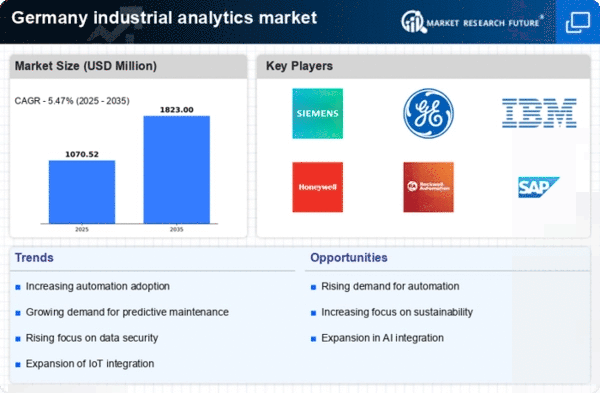Focus on Operational Efficiency
A pronounced focus on operational efficiency is emerging as a key driver in the industrial analytics market in Germany. Companies are under constant pressure to reduce costs and improve productivity, leading to a heightened interest in analytics solutions that can streamline operations. In 2025, it is anticipated that around 75% of industrial firms will prioritize investments in analytics tools aimed at enhancing operational efficiency. This trend is likely to result in a market growth rate of approximately 12% annually over the next five years. By utilizing analytics to identify inefficiencies and optimize processes, organizations can achieve substantial cost savings and improve their overall competitiveness. Consequently, the industrial analytics market is expected to expand as businesses increasingly recognize the importance of operational excellence in achieving sustainable growth.
Integration of Advanced Technologies
The integration of advanced technologies such as artificial intelligence (AI) and machine learning (ML) is transforming the industrial analytics market in Germany. These technologies enable organizations to analyze vast amounts of data in real-time, facilitating quicker and more accurate decision-making processes. In 2025, it is projected that approximately 60% of companies in the industrial sector will implement AI-driven analytics solutions. This shift is expected to enhance predictive maintenance capabilities, reduce downtime, and optimize resource allocation. The potential economic impact of these technologies is substantial, with estimates suggesting that AI could contribute up to €30 billion to the German manufacturing sector by 2030. As businesses increasingly adopt these advanced technologies, the industrial analytics market is likely to witness significant growth, driven by the demand for innovative solutions that enhance operational efficiency.
Emphasis on Supply Chain Optimization
The industrial analytics market in Germany is witnessing a growing emphasis on supply chain optimization. As companies strive to enhance their supply chain resilience and responsiveness, analytics solutions are becoming indispensable. In 2025, it is projected that nearly 65% of manufacturing firms will implement analytics tools to improve supply chain visibility and efficiency. This trend is driven by the need to mitigate risks and respond swiftly to market fluctuations. The potential benefits of optimized supply chains are substantial, with estimates suggesting that companies could reduce operational costs by up to 15% through effective analytics utilization. As organizations increasingly focus on supply chain optimization, the industrial analytics market is likely to experience robust growth, fueled by the demand for solutions that enhance supply chain performance.
Rising Demand for Data-Driven Decision Making
The industrial analytics market in Germany experiences a notable surge in demand for data-driven decision making. Companies are increasingly recognizing the value of leveraging data analytics to enhance operational efficiency and optimize production processes. In 2025, it is estimated that around 70% of manufacturing firms in Germany will adopt data analytics solutions to improve their decision-making capabilities. This trend is driven by the need to remain competitive in a rapidly evolving market landscape. As organizations strive to harness the power of data, investments in advanced analytics tools and technologies are expected to rise significantly, potentially reaching €2 billion by 2026. This growing emphasis on data-driven strategies is likely to propel the industrial analytics market forward, as businesses seek to gain insights that can lead to improved performance and profitability.
Growing Importance of Cybersecurity in Analytics
As the industrial analytics market in Germany expands, the importance of cybersecurity in analytics solutions is becoming increasingly apparent. With the rise of data breaches and cyber threats, organizations are prioritizing the protection of sensitive data used in analytics processes. In 2025, it is expected that around 55% of companies will invest in cybersecurity measures specifically tailored for their analytics platforms. This focus on cybersecurity is likely to drive innovation in the market, as vendors develop more secure analytics solutions to meet the evolving needs of businesses. The potential market for cybersecurity in analytics is projected to reach €1 billion by 2027, reflecting the growing recognition of the need for robust security measures. As organizations seek to safeguard their data, the industrial analytics market is poised for growth, driven by the demand for secure and reliable analytics solutions.
















